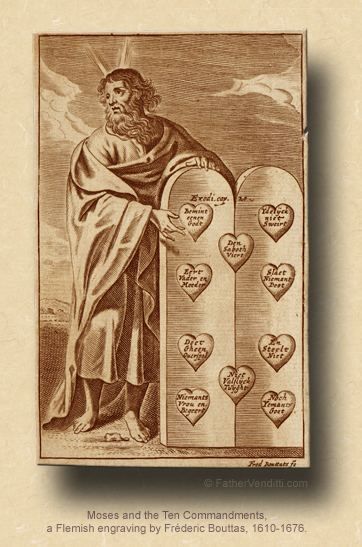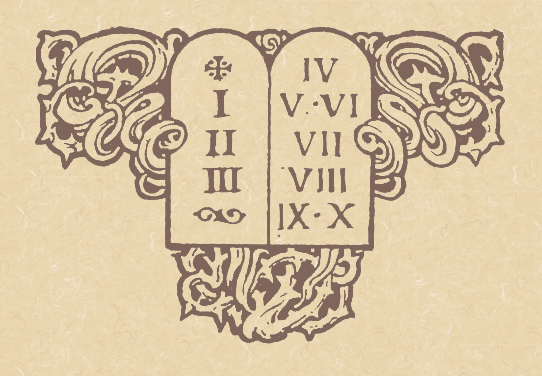The Gnostics Are Still with Us.
The Memorial of Saint Irenaeus, Bishop & Martyr.*
Lessons from the secondary feria, according to the ordinary form of the Roman Rite:
• II Kings 24: 8-17.
• Psalm 79: 1-5, 8-9.
• Matthew 7: 21-29.
The Second Class Vigil of the Apostles Peter & Paul.**
Lessons from the proper, according to the extraordinary form of the Roman Rite:
• Acts 3: 1-10.
• Psalm 18: 5, 2.
• John 21: 15-19.
FatherVenditti.com
|
 9:24 AM 6/28/2018 — Yesterday’s first lesson, from the Second Book of Kings, was a lesson on how to solve the world’s problems. The Kingdom of Judah is in bad shape; nothing you can really put your finger on; just a really long stretch of bad luck: a lot of wars, a lot of pestilence and disease, a lot of famine and poverty. So, these two fellows—one of whom is a priest, the other a scribe—are kicking around in the ruins of the Temple, when they stumble upon a book. They don't know what it is, but we do: it's the first five books of the Bible, known as the Books of Moses or, what Second Kings refers to as “The Book of the Law.” They take it to their king, and he reads it; and, like a light bulb going off in his head, he realizes what's been going wrong all this time. He calls the entire Kingdom together—I guess you could do that in those days—and has the book read out loud; and, like their king, the whole country understands what the problem has been all along: their ancestors made this covenant with God, but somewhere along the line it had been forgotten. 9:24 AM 6/28/2018 — Yesterday’s first lesson, from the Second Book of Kings, was a lesson on how to solve the world’s problems. The Kingdom of Judah is in bad shape; nothing you can really put your finger on; just a really long stretch of bad luck: a lot of wars, a lot of pestilence and disease, a lot of famine and poverty. So, these two fellows—one of whom is a priest, the other a scribe—are kicking around in the ruins of the Temple, when they stumble upon a book. They don't know what it is, but we do: it's the first five books of the Bible, known as the Books of Moses or, what Second Kings refers to as “The Book of the Law.” They take it to their king, and he reads it; and, like a light bulb going off in his head, he realizes what's been going wrong all this time. He calls the entire Kingdom together—I guess you could do that in those days—and has the book read out loud; and, like their king, the whole country understands what the problem has been all along: their ancestors made this covenant with God, but somewhere along the line it had been forgotten.
Today’s first lesson skips ahead from yesterday’s by a couple of chapters, showing what happens when the law of God is ignored: Jerusalem is conquered and the Jews are sent into exile in Babylon. A good portion of the Psalms were written during the Babylonian Captivity, including today’s: “O God, the heathen have broken into thy inheritance; they have profaned the temple, thy sanctuary, and left Jerusalem in ruins … Lord, must we always taste thy vengeance, must thy jealous anger still burn unquenched?” (Psalm 79: 1, 5 Knox). These psalms of lament were being sung by a people who came to understand that their suffering was the direct result of not having been faithful to God.
When our Lord, in our Gospel lesson today, speaks of a house built on sand which cannot stand up in the wind and rain, for what is he making that an analogy? “And everyone who listens to these words of mine but does not act on them…” (Matthew 7: 26 RM3). Our faith is not something to be simply proclaimed or preached. It’s something to be lived; and, while none of us will ever live it perfectly—and can’t live it to any degree at all without grace—we understand exactly what our Lord means when he says that it isn’t those who “say” but those who “do” that please the Father.
The Gnostics, in the second and third centuries, thought their showy mysticism and politically correct theology exempted them from actual moral living, which is why today’s saint, the bishop and martyr Irenaeus, condemned them … for which they murdered him. Let us ask him to intercede for us, that he might ask our Blessed Lord to send us the grace to actually live what it is we say we believe.

* A disciple of St. Polycarp, who was himself a disciple of the Blessed Apostle John, Irenaeus (125-203) locked horns principally with the Gnostics, who polluted the integrity of the Faith with secular philosophy and a watered-down, populist theology. Before his death, he succeeded the martyred St. Pothinus as Bishop of Lyons.
** In the Roman Rite, the concept of a vigil differs completely between the ordinary and extraordinary forms. While in the ordinary form a vigil is simply a celebration of the feast the evening before, in the extraordinary form the word “vigil” designates the entire day before a First Class Feast, and the Mass on that day takes place in the morning. The texts and lessons, while proper to the vigil, are always different from that of the feast itself, and no obligation is satisfied. If a feast carries an obligation, this must be satisfied on the feast itself; the extraordinary form does not offer the opportunity to satisfy an obligation on the evening before. The vigil of a first class feast is a feria of the second class, and takes precedence over any third class feast that may fall on that day: in this case, that of St. Irenaeus, which is transfered to July 3rd.
|

